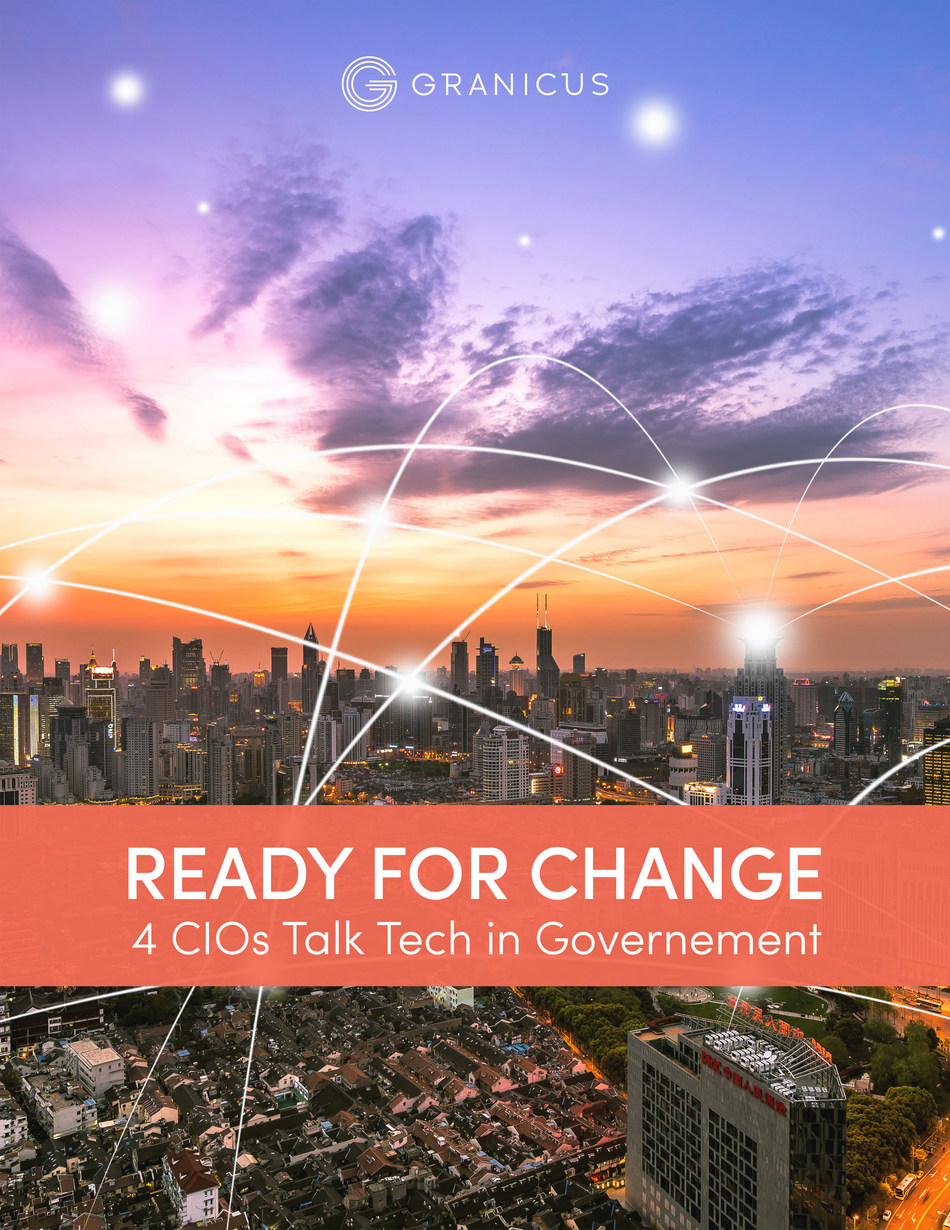Government CIO/CTOs Share Roadmap for Citizen-centric Innovation
Granicus, State & Local IT executives discuss keys to creating modern and secure digital government agencies
WASHINGTON, Nov. 27, 2018 /PRNewswire/ — In its quest to create a blueprint for government leaders striving to keep pace with rapidly evolving technology, Granicus, the leading provider of cloud-based software solutions to government, recently gathered a group of the nation’s most transformative chief technology officers to discuss trends shaping the government IT sector.

“The world is experiencing an incredible technology renaissance, and in few places has that change been more evident—or substantial— than in government technology,” said Bob Ainsbury, chief product officer at Granicus. “Many public sector CIOs and CTOs have found themselves on the bleeding edge of improving the citizen experience, breaking new ground with emerging cloud technologies.
“Government agencies that are embracing new technology are driving innovative and enhanced connections with their citizens – making it easier for them to stay informed and access vital services,” Ainsbury said. “The government leaders who recognize this are driving bold new strategies, aggressively deploying the latest in cloud technology across their organizations and using data in radically new ways.”
Presenting their insights were four state and local CIOs: Rob Lloyd, chief information officer for the City of San Jose, California; Suma Nallapati, secretary of pathology and chief information officer for the Governor’s Office of Information Technology at the State of Colorado; Bob Samson, chief information officer New York State’s Office of Information Technology Services; and Denis Goulet, commissioner for the Department of Information Technology for the State of New Hampshire.
These innovators identified the following six critical drivers of a more modern government agency:
- Citizen-Centric: All technology and processes are designed, built and deployed around people – both government employees and citizens. Lloyd said that smart, intelligent communities must start from the citizen’s perspective, work across departments, enlist external partners and break down internal silos to build organizations that are “powered by people” to create better services from the customer point of view.
- Data-Driven: “Data is the new oil,” said Samson. Nearly everything we do is measured, and the government organizations that take advantage of that data thoughtfully and securely, stand to reap the greatest benefits—whether it’s improving snow removal with smarter roads, improving yields by tracking agricultural and livestock output, or communicating more effectively by targeting engaged audiences. Oil is what props up many governments today. Data is what will keep them going tomorrow. Samson said government leaders who fail to harness the power of data are doomed to lag behind their peers.
- Future Ready: Modern agencies are those that build a platform and foundation that can prioritize change and scale to any situation as it arises. Whether it’s a cyber breach or a weather emergency, agencies must be prepared to anticipate and react to life situations in real-time while ensuring trusted and reliable engagement with citizens.
- Interoperable: Modern government agencies are built on a foundation of data interoperability, ensuring disparate systems share a common data landscape. The age of ubiquitous computing is here: “Processes throughout society are becoming more instrumented, interconnected and intelligent in new and profound ways,” said Samson. Systems that support open APIs and connected processes deliver profound advances that make tasks, like renewals and payments, easier for citizens.
- Secure by Default: Security is not an application or another box to check off. It’s a way of life that must be embedded in government software, hardware and operations. Goulet said that centralization of security responsibilities and widespread cyber awareness training have been keys to protecting the technological infrastructure of his state.
- Committed to Connections: Engagement is a two-way street. Modern governments embrace tools that allow them to stay attuned to how citizens respond to government policies, actions and communications. Nallapati shared her state’s cloud-first approach to modernization and how that is influencing the lives of citizens and state employees. By prioritizing projects that have the greatest impact from a citizen perspective, Colorado is interacting with citizens in new and more effective ways — from the myColorado web portal, which serves as a single entry point for a broad range of state services, to the myDMV mobile app, where residents can renew licenses, update addresses and request driving records without waiting in line. “Technology is easy,” Nallapati said. “People and processes are harder to change. We move at the speed of trust, focusing on the right tech, right innovation and right mindset.”
“Smart CIOs are ready to embrace the massive paradigm shift around government’s relationship to technology,” Ainsbury concluded. “With their guidance, and an iterative approach, a brighter future for citizen engagement and service delivery has arrived.”
To view presentations and listen to the full recording of the CIO virtual summit, please visit https://go.granicus.com/VirtualSummit.html.
About Granicus
Granicus provides technology and services that empower government organizations to create seamless digital experiences for the people they serve. By offering the industry’s leading cloud-based solutions for communications, content management, meeting and agenda management, and digital services to over 4,000 public sector organizations, Granicus helps turn government missions into quantifiable realities. Granicus products connect more than 185 million people, creating a powerful network to enhance citizen engagement. By optimizing decision-making processes, Granicus strives to help government see better outcomes and a greater impact for the citizens they serve.
Media Contact:
Lynette Viviani
(973) 534-1004
lynette.viviani@vivianipr.com
